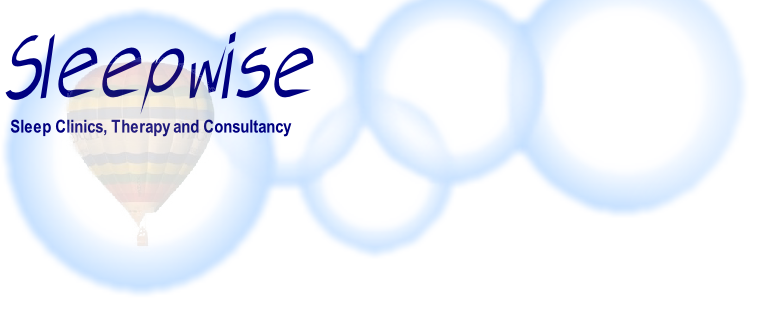

Sleepwise Sleep Clinics and Therapy
Sleepwise provides professional sleep therapy services and advice, including clinics, one-

Sleep & Stress
Consultants
since
1999




WHAT YOU CAN DO
What can you do when you can’t get back to sleep? Well the worst thing you can do is to lie there worrying about the situation.
Many famous people and very successful have had the same problems, some of them only being able to sleep for three or four hours at a time. Their answer has always been to make use of that time, some claiming this as being the secret of their success.
Modern technology has helped us to understand how the mind works differently under different conditions. Brain scans show how being awake uses different parts of the brain compared to dreaming, compared to a hypnotic trance, compared to meditating.
It is believed that that nighttime periods of wakefulness are particularly productive times. Many creative people describe how new ideas and concepts suddenly pop into their minds, writers tell of how the plot for their new book was revealed to them in the early hours after weeks of writers block.
Famous leaders like Winston Churchill was said to sleep 5 hours a night on average, and claimed to be more productive and get his best ideas while others slept, but he also advocated a substantial daily nap on top of that modest allowance. He lived to 91 so it did not do him too much harm, however sleep deprivation can have serious consequences (see Sleep Deprivation article).
It is common for people who awake after just a few hours sleep to accidentally fall asleep again once they have started to work on something creative or requiring a high level of imagination. However, to do this you must be in a position and location where falling asleep is both possible and comfortable. This for most people means finding something to do whilst in bed or in a comfortable chair.
It is important that if you are intending to read a book if you wake up, that the book is not too exciting or stimulating. So taking a good book to bed with you is not the best idea. Taking a book that stretches the imagination in a more gentle way is fine. Real life dramas should be avoided but factual books are fine, one client says they soon drop off if they browse an encyclopaedia.
Keeping with the book theme, a good creative activity that induces sleep is starting to write a book. Have a notepad and pen ready, think of plots, characters, locations, etc. Make sure you close your eyes as you use your imagination, then as the ideas pop into your head open your eyes and note them down. Try and think of more and more complex plots and only write them down when you have a good plot that works. Use a pen that does not leave marks on your sheets.
We have invited feedback from people who have found solutions to the night time wakefulness and you may be surprised what people do. Reading a book and writing stories was very popular, but how about imaginary chess where you play both black and white holding an image of the playing board in your head? Or recalling a country walk in detail, so going on a walk during the day, maybe weeks before, and then recalling as much detail as possible, including sounds, smells and touch?
One of the more common activities was meditation. Simply sitting still in the bed, in the lotus position if you can manage it, and meditating. There are differences of opinion if meditation can be used to replace sleep, but most people who use this technique find that they feel very refreshed the next morning. Plus, gradually, the time they remain asleep before waking increases.